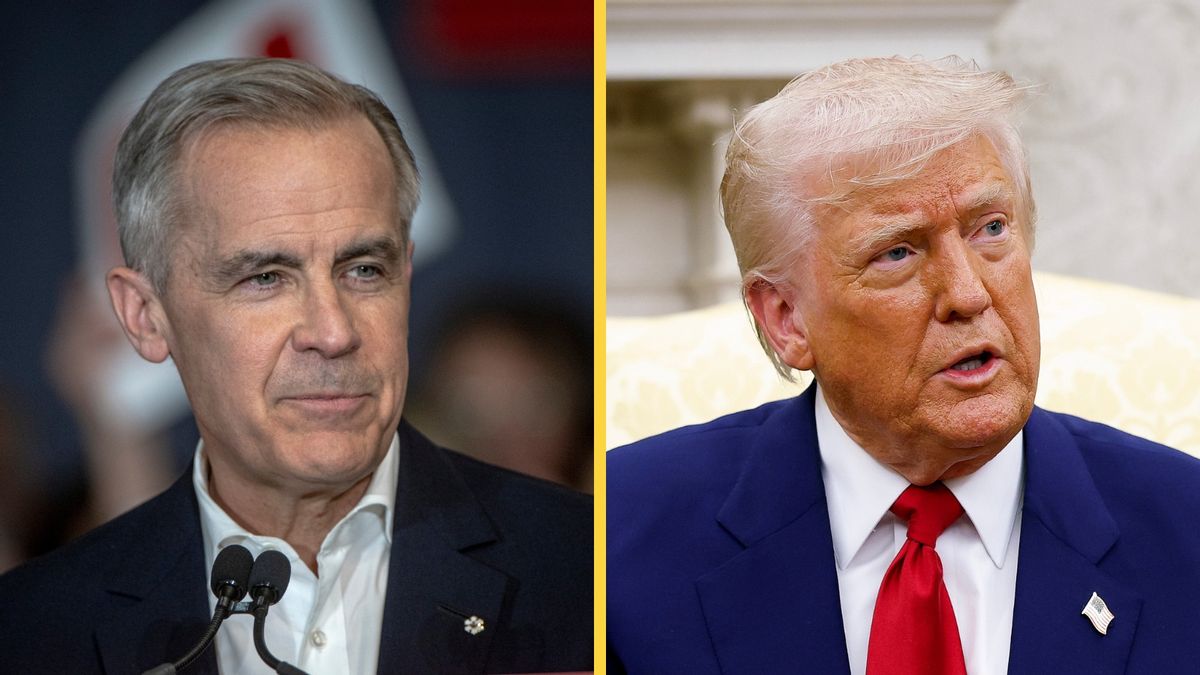- In early April 2025, a rumor began to spread that U.S. President Donald Trump had backed down on tariffs because
Canadian Prime Minister Mark Carney forced his hand by orchestrating a collective sale of U.S. bonds. - It is true that Trump paused tariffs after the price of U.S. Treasurys began to drop at the same time as the price of U.S. stocks plummeted, an event known as a synchronized sell-off. In fact, after he announced the pause, Trump said, "bond markets are tricky."
- However, the claim that Carney had orchestrated the bond sell-off alongside the European Union and Japan was not confirmed. It came from the newsletter of Dean Blundell, a staunch supporter of Carney in Canada's next federal election and a former "shock jock."
- Snopes has contacted Blundell, asking him to explain how he came upon this story and to clarify some points from his allegations. Snopes also contacted Carney's office asking for confirmation of Blundell's claims. Lastly, we have reached out to several fixed income analysts to inquire about the plausibility of such a scheme.
In the days that followed U.S. President Donald Trump's announcement that he had paused the sweeping reciprocal tariffs he imposed a week prior, speculation arose that he had done so because former central banker and Canadian Prime Minister Mark Carney had orchestrated a massive sale of U.S. bonds to force Trump to soften his trade stance.
For example, a post on Facebook relayed the claim, saying Carney's move was a "checkmate" (archived):
As of this writing, the post had garnered 251 reactions and 60 comments. Users shared another post relaying the same story 712 times. A summary of same story appeared on X. Further, Snopes readers searched the website seeking confirmation that Carney was behind the sell-off.
The allegations stemmed from a newsletter installment by Dean Blundell, a Canadian former radio personality who
As a new federal election approached in Canada, Blundell has posted content in support of Carney, who replaced Justin Trudeau as prime minister in March 2025 and who, as the leader of the Liberal Party, was running against Pierre Poilièvre of the Conservative Party. Blundell's stance has also been staunchly anti-Trump and anti-Poilièvre.
Blundell asserts Carney retaliated against U.S. tariffs with bonds
Bundell was correct that a downturn in the U.S. Treasurys market forced Trump to pause tariffs on April 9, 2025:
When a reporter asked what justified the pause, Trump replied: "The bond market is very tricky."
Indeed, after Trump announced the sweeping reciprocal tariffs on April 2, a dynamic
However, two days after the tariffs announcement, the price of bonds began to fall along with the price of stocks, forcing bond yields up. Synchronized sell-off events can lead investors to abandon U.S. securities. Further, the consequences of a sharp increase in bond yields can lead to an increase in borrowing costs both for the government and for businesses and households, leading to an economic downturn.
Carney, an accomplished economist and the former governor of both the Bank of Canada and the Bank of England, understands this mechanism. Further, Carney steered monetary policy in Canada during the Great Recession of 2008, when credit around the world nearly froze. But in his story, Blundell asserted that Carney slowly amassed U.S. Treasurys — government debt in the form of bonds — in early 2025. When we reached out to Blundell, we asked when Carney would have started to do this, given he only became prime minister of Canada on March 14, 2025.
Blundell is also correct that other governments can hold Treasurys. For example, the U.S.' largest creditor is Japan, which held more than $1 trillion in Treasury securities in early 2025, according to the U.S. Department of Treasury. The second largest is China, with $760.8 billion. In third place is the U.K., with $740.2 billion. Canada holds $350.8 billion.
How the scheme allegedly took place
In his newsletter, Blundell alleged that, a
In the first few weeks of his presidency, Trump indeed touted a significant tariff announcement in April, though he gave no details about its magnitude. However, 25% tariffs on Canadian products had been in place since March 4, 2025.
According to Blundell, when the tariff announcement finally came, Canada, the EU and Japan were in a position to sell Treasurys and rattle Trump enough to make him remove the tariffs.
"China's still in the crosshairs—125% duties are no joke—but Canada? The EU? Japan? They're off the hit list," Blundell wrote. "For now, at least. Why? Because Carney's play wasn't noise. It was power."
Indeed, Trump lowered tariffs on the EU and Japan to 10% and paused them for 90 days. He also raised tariffs on China to 125%. However, as per the White House, tariffs on Canada were still in place. Indeed, Canada had been excluded from the pause in reciprocal tariffs. When Snopes reached out to Blundell, we also asked what he meant when he said Canada was "off the hit list," alongside Japan and the EU. We will update this report should he respond.
